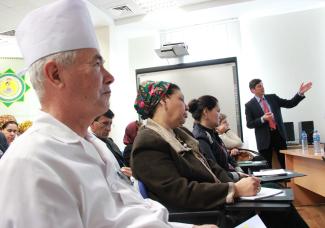Turkmenistan’s growing tuberculosis (TB) epidemic presents a challenge not only to its public health system but also to the country’s long-term economic resilience. The country has a high TB burden and rapidly growing rates of multidrug-resistant TB. To combat TB, USAID has introduced new drugs that help shorten treatment time and detect and treat multidrug-resistant TB. Over the past 20 years, USAID has helped increase the success rate of TB treatment by 32 percent in Turkmenistan.
U.S.-funded programs increase access to key services to help prevent the transmission and contain the expansion of all forms of TB. USAID supports activities that improve the delivery of prevention, care and treatment services for TB; enhance the capacities of institutions and health staff capacity to address multidrug-resistant TB; develop systems to strengthen diagnosis of drug-resistant TB; and improve infection control practices. USAID works with health officials to expand the use of patient-centered outpatient treatment approaches. USAID also helps health providers, communities and patients understand the importance of proper treatment and care of all strains of TB, thereby increasing the demand for quality services which improves treatment adherence for those infected.
In addition to partnering with the Government of Turkmenistan to contain the spread of TB, the United States government has made available more than $920,000 in health assistance for Turkmenistan to help prepare laboratory systems, activate case-finding and event-based surveillance, support technical experts for response and preparedness, bolster risk communication, and more.
The United States has invested approximately $21 million in healthcare in Turkmenistan over the past 20 years.

USAID
